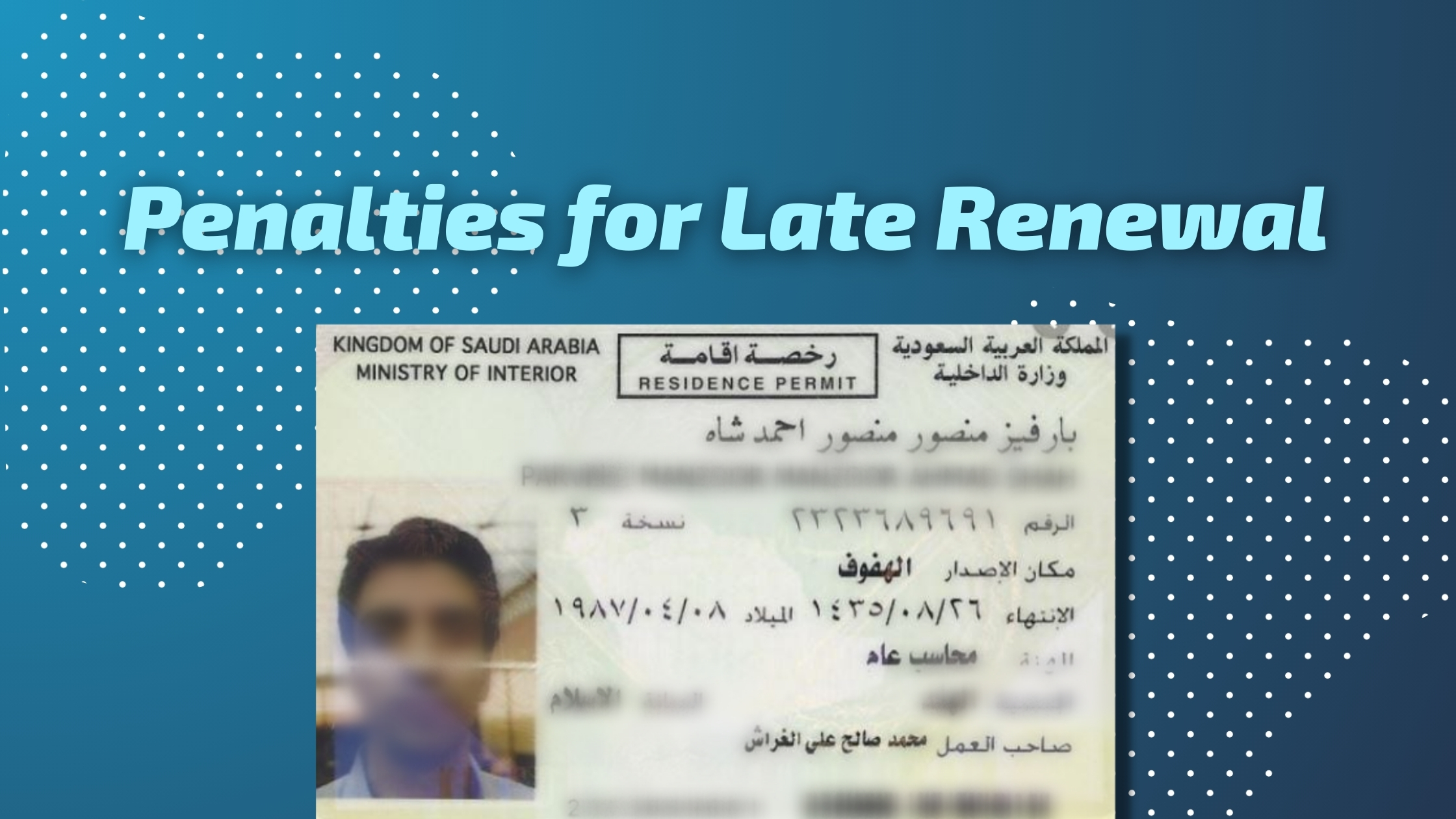Understanding Iqama Expiry Penalties
Violation of Iqama Renewal
In Saudi Arabia, adhering to the regulations regardingthe Iqama, or resident ID, is crucial for expatriates living in thecountry. Failure to renew the Iqama before its expiry date isconsidered a violation and triggers a series of penalties. Employersare typically responsible for the renewal process and associated fees,especially for their employees and any dependents.
The renewal process has been streamlined with the advent ofonline services, allowing for renewals up to six months in advance and evenfrom outside the country. However, neglecting this duty can lead to significantfines and, in severe cases, deportation.
It is highly recommended to initiate the Iqama renewal atleast three days before its expiration to avoid any penalties.
The fines for late renewal escalate with each occurrence:
- First-time delay results in a fine of SR 500.
- A second delay incurs a fine of SR 1,000.
- By the third instance, the individual may face deportation proceedings.

Penalties for Late Renewal
Failing to renew your Iqama before its expiry can lead tosignificant penalties. The first instanceof late renewal results in a fine of SR 500. If it happens asecond time, the fine doubles to SR 1,000. A third delay may result in the mostsevere consequence: deportation. It is crucial for employers toaddress any delays promptly at a Jawazat office to avoid escalating penalties.
Residents must be vigilant in renewing their Iqama to avoidfines. The process involves clearing any outstanding fees, such as trafficfines or dependent fees, and ensuring a valid health insurance policy is inplace. Here's a quick checklist for Iqama renewal readiness:
- Valid health insurance policy
- Payment of dependent fee (if applicable)
- Clearance of any traffic fines
- Payment of Iqama renewal and work permit fees
Remember, the responsibility of renewing an Iqama typicallyfalls on the employer. As a resident, it is advisable to communicate with youremployer to ensure timely renewal and avoid penalties.
Checking Iqama Expiry Date
Keeping track of your Iqama expiry date is crucial to avoidpenalties. You can easily check the expiration date of your Iqamaonline through the Absher platform or the 'MOL KSA' website. Toproceed, you will need your Iqama number and your date of birth, which you canenter in either the Gregorian or Hijri calendar formats.
It's important to regularly verify the validity of yourIqama to ensure compliance with Saudi Arabia's residency regulations.
The process is straightforward:
- Visit the Absher platform or the 'MOL KSA' website.
- Select the language of your preference: English, Arabic, or Urdu.
- Enter your Iqama Number.
- Choose the calendar type and input your date of birth.
- Enter the captcha code and click the 'Next' button.
- Your Iqama expiry date will be displayed on the following page.
For added convenience, the Absher app is available for bothAndroid and iOS devices, allowing you to check your Iqama status on the go.

Renewal Process
Once the renewal process is complete, it is crucial tounderstand the consequences of not adhering to the Iqama expiryregulations. Failure to renew your Iqama before its expiry date canlead to severepenalties, including fines, imprisonment, or deportation. Employers aretypically responsible for the renewal of their employees' Iqamas and must bearthe associated costs. If an employer neglects this duty, employees have theright to file a complaint.
For those with dependents, a dependent levy must be paid aspart of the renewal process. It is essential to ensure that all fees, includingany penalties for late renewal, are settled to avoid complications. Thefollowing list outlines the key steps involved in the renewal process:
- Verify the requirements for Iqama renewal
- Ensure your employer initiates the renewal if you are an employee
- Pay the dependent levy if applicable
- Settle any outstanding fees or penalties
It is imperative to stay vigilant and proactive in renewingyour Iqama to maintain legal residency status within Saudi Arabia.
Consequences of Expired Iqama
An expired Iqama can lead to several complications forexpatriates living in Saudi Arabia. Immediaterenewal is crucial to avoid legal issues and penalties. The first timean Iqama is not renewed on time, a fine of SR 500 is imposed. Subsequent delaysresult in increased fines and can escalate to deportation after the thirdoffense.
Deportation is not the only consequence of anexpired Iqama. Without a valid resident ID, expatriates cannot engage in anyofficial transactions, which includes but is not limited to, banking services,mobile phone services, and employment activities. Here is a list of potentialissues arising from an expired Iqama:
- Inability to renew driver's license
- Difficulty in accessing healthcare services
- Restrictions on travel and re-entry into Saudi Arabia
- Challenges in transferring sponsorship or changing employers
It is essential to understand that the renewal of an Iqamais not just a formality but a legal requirement. Neglecting this duty canseverely disrupt an expatriate's life in Saudi Arabia.
Iqama Fine and Deportation
In Saudi Arabia, the consequences of not renewing an Iqama ontime can be severe. Individuals found without a valid Iqama may facefines or deportation. Employers are also at risk; failing to secure anIqama for foreign employees can result in fines up to SAR 100,000 perviolation.
The fines for late renewal escalate with each occurrence.For the first offense, the fine is SR 500. A second offense increases the fineto SR 1,000. By the third offense, the individual risks deportation. It iscrucial for both residents and employers to adhere to the renewal deadlines toavoid these penalties.
It is advisable to renew your Iqama at least 3 days beforeits expiry to prevent any penalties.
Residents must ensure they carrytheir Iqama at all times as mandated by Saudi law. Failure to do socould lead to additional fines, emphasizing the importance of understanding andcomplying with local regulations.
Conclusion
In conclusion, understanding the penalties for Iqama expiryis crucial for residents in Saudi Arabia. Failure to renew the Iqama on timecan result in fines and even deportation. It is important to stay informedabout the expiration date of the Iqama and take timely action to avoidpenalties. By following the proper procedures for renewal and staying updatedon the regulations, residents can ensure compliance with the law and avoidunnecessary consequences.
Need help in Overseas Recruitment for Saudi Arabia? Let Delta International Recruitment Agency help you will all your staffing needs.




























